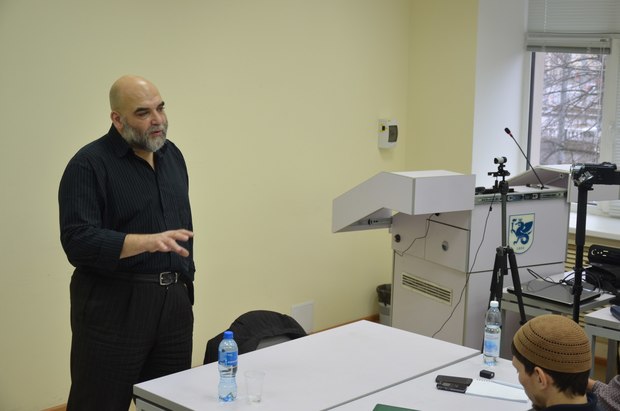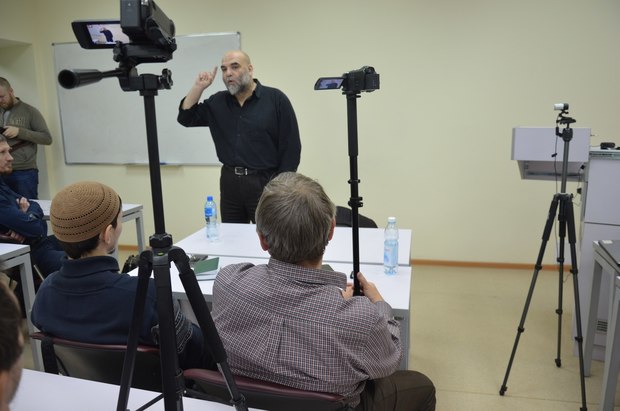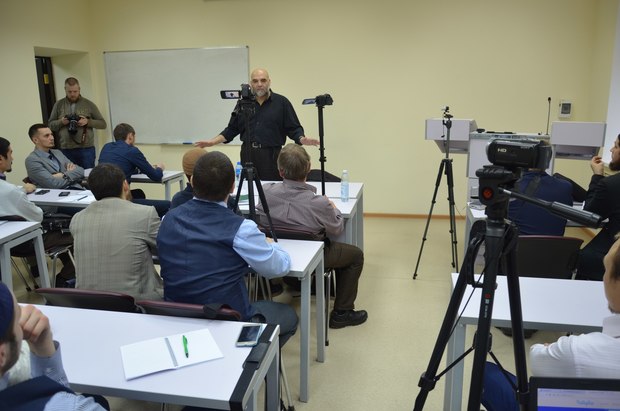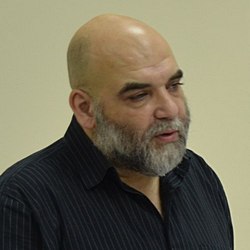‘If they leave Middle East too early it will mean loss of influence. If Trump is adequate he won't do this’
A famous Russian journalist Orhan Dzhemal taught in Kazan how to defeat Islamic State
How did Islamic State (ISIS — the terrorist organization banned in Russia) appear in its modern sense? What should we oppose its destructive ideology instead of military operations? How will the election of Donald Trump affect the policy of the Unites States on Syria? These and many other questions were answered by a famous Russian journalist Orhan Dzhemal, who arrived in Kazan at the invitation of the Resource center for development of Islamic and Islamic studies education of the Kazan Federal University to deliver a lecture in the school of Muslim leader Makhallya 2.2. A correspondent of Realnoe Vremya also asked him questions.
Collapse of the Ottoman Caliphate and first Islamists
In his lecture 'The Ideology of Islamic State' Orkhan Dzhemal told about the evolution of ideas that gradually led to what the entire world can see now. He gave a detailed answer to the question about how in Syria and Iraq there appeared Islamic State in its modern sense.
'In Medina after the migration. Yes, we are talking about the caliphate immediately after the resettlement. We will call it the Islamic state, although I'm not sure that what was in Medina during the lifetime of our Prophet can be called a state in its modern sense. This state has a peculiarity — extraterritoriality. In other words, the Prophet and then the caliphs were the sovereigns of all Muslims, regardless of where they were,' said the speaker.
According to Orkhan Dzhemal, there were several caliphates, the last one was the Ottoman one (according to various sources, it ended in 1908 or 1922). The Muslims, starting from the VII century to the XX century, lived under the conditions when they were politically united in a certain subject, but after the First World War and the defeat of Turkey, the Muslims remained without their subject and without their policy — the legacy that remained since the Prophet times until the last Turkish Sultan suddenly disappeared. However, in 1927, in Egypt there appeared a party known as al-Ikhwān al-Muslimūn (the Muslim Brotherhood; the modern movement is prohibited on the territory of Russia — editor's note). The essence of this movement was to return to the implementation of the Islamic political doctrine and the restoration of Islamic political subjectivity. By the way, this party went through different periods — radicalism, terrorism, there also was the period when its henchmen stated that they should use democratic tools to gain power.
The speaker addressed the audience and asked if anyone could tell the meaning of the word 'Islamism'. Someone said: 'Hell-the-box, mostly fished out by media!'. Another participant suggested: 'Islam belongs to the field of spiritual, and Islamism — of political'. Orkhan Dzhemal agreed with the second definition: 'A good explanation. Indeed, Islamism is the implementation of Muslim political ideas in the surrounding political space.'

The first Islamist organization is al-Ikhwān al-Muslimūn. According to the speaker, everything else has just been detached from 'ikhwans', including all jihadist organizations, including the party Hizb ut-Tahrir (also banned in Russia — editor's note), which, in fact, is a Palestinian branch of al-Ikhwān al-Muslimūn. Dzhemal stressed the need to make a very clear distinction between religious movements within Islam and what he just called Islamism.
'When we look at all doctrinal movements within Islam, we should understand that behind every Islamic sect there was a political conception. First, the Shiites broke away, but initially was it a political or religious movement? Yes, a political one – it is the supporters of hazrat Ali, after his death, the supporters of the Alids. At what point did Shi'ism cease to be a political movement and became a religious doctrine? It is when Ja'far al-Sadiq said that Imamate is not equal to a Caliphate, in other words, spiritual power is not equal a secular one. At this point he made the political content of Shiism meaningless. Then a spiritual development began, which led to numerous sectarianisms,' said Dzemal.
'Al-Qaeda was not building a state. For the first 15 years of its existence, it was absolutely veterans' movement'
So, the XX century came, there was no caliphate, but there was the idea of restoring of the Islamic subjectivity. About until 1980, 'ikhwans' were totally uncontested nerve of all Islamism, but in the 1980s the situation began to change — it was due to the Afghan war: a mass flow of volunteers from various Islamic countries hustened to Afghanistan. Who were the leaders of the foreign Mujahideen of Afghanistan? What political structures did they refer to? Orkhan Dzhemal has no doubts — they all were 'ikhwans''. That is, people who stood at the origins of Al-Qaeda (banned in Russia — editor's note) — these are the same people who originally were part of the political system, where the central question was about the restoration of Islamic subjectivity in the world.
It is worth noting that Al-Qaeda was not building a state. For the first 15 years of its existence, it was absolutely veterans' movement, which did not differ from the movement of veterans of Afghanistan under the command of Gromov, for example. They, like our Afghans, went to politics, clashed with the government and so on.
'I want to remind you that Yemen at the time consisted of two parts: the South part was Pro-Soviet and Yemeni officers had socialist ideas there. After the collapse of the Soviet Union, they tried to gain control over everything but the Yemeni government survived due to an agreement with… the veteran structure, which subsequently was called Al Qaeda of Yemen. From bad to worse, Al-Qaeda occupied a dominant position, began to promote the ideology associated first with anti-Americanism, but there was no word about a state! They criticized the parent structure — 'ikhwanists' for softness, but they themselves offered nothing. The first ones who declared the restoration of Islamic political subjectivity was the Taliban. Al-Qaeda still retains the oath to the leader of the Taliban (the organization banned in Russia — editor's note),' said Orhan Dzemal.
The Taliban was the first attempt to restore political subjectivity in practice, but it was done very sloppy, marginally, and, moreover, by people who absolutely did not correspond to the level of development of society around the world and the Islamic society in particular. Afghanistan in the1990s was the 'margins of Islam', but they made an attempt. It failed because of the archaism, inflexibility, and national specificity, and it all ended in 2001 by the invasion of the Americans. And the first proto-caliphate organization went into guerrilla warfare.

Few heard of Islamic State until 2013 — that's when the real revolution took place
$300 thousand for promotion of the most effective structure on the territory of Syria
'It is noteworthy that against this background there already existed what we know as ISIS. The core group — The Organisation of Monotheism and Jihad. In 2006, a meeting was held, gathering small six groups, and this conglomerate was called 'The Islamic State of Iraq'. Initially they wanted to free Iraq from US occupation — it was not about creating a caliphate. For almost seven years it evolved and was first named ISIS of Iraq, then became known as the IS of Iraq and al-Sham (Syria — editor's note) and then threw all geographic suffixes and just became IS. Interestingly, we started with the fact that the main political feature of the Caliphate lays in the fact that it is extraterritorial,' told the speaker. 'The Islamic State of Iraq was one of the parts of Al-Qaeda.
Few heard of Islamic State until 2013 — that's when the real revolution took place.
'When in 2011 the Syrian civil war began, in neighboring Iraq Islamic State of Iraq decided not to intervene in the situation in Syria, and decided to create a separate subsidiary specifically on the Syrian issue — best known for Jabhat Fateh al-Sham (the organization, which activity is prohibited in Russia — editor's note). In 2011, a ridiculous sum of 300 thousand dollars was given for its promotion. There appeared the most effective terrorist group in Syria, the most popular, it was the vanguard of the fight against al-Assad,' told Orhan Dzhemal.
At some point, the success of Al-Nusra Front literally eclipsed the parent structure — IS of Iraq. In 2013, they were invited to be dismembered, but it didn't happen — these people refused to return to the 'bosom of the mother'. This was followed by a complex correspondence of the leaders of the groups, some of which, by the way, was even translated into Russian language. During the same period, the leader of Al-Nusra Front survived two assassination attempts.
'If to talk about the general political picture, we should recognize one simple thing — at the beginning of 2014, it is the Islamic State has saved Bashar al-Assad. He would not have survived to the present day, if there had it not been this 'distracting' conflict between the terrorist entities,' believes the speaker.
Of course, this conflict was necessary to resolve, and the arbitrator was the leader of Al-Qaeda, which de facto took the side of Al-Nusra, saying that they were fighting in Syria, and IS of Iraq, respectively, in Iraq. Following this, the leader of Al-Qaeda was accused of support of the European doctrine that divided Iraq and Syria into two separate states — people refused to obey him. At this point, Islamic State made a fantastic step — they declared that beyond it there was no point of reference. The reference point was only within the Islamic state — it is the caliphate.

How to destroy the destructive idea?
Having completed the report on the emergence of Islamic State, Orhan Dzhemal decided to speculate on who enters this organisation and for what reasons. The speaker believes that it is incorrect to say that it is mostly 'psychopaths who want to satisfy their desires and aspirations' who go there. The bulk of the militants of IS, according to Dzhemal, are not newcomers but local Arabs who sympathize with ISIS.
'In fact, the militants of IS are at 85% local resources. You should not think that the British, Australians arrived to implicitly realize their aspirations. They are attracted by the idea, the word 'Caliphate' and all the package of expectations and hopes that are behind these words.'
According to Dzhemal, the method of force in this case is powerless — the idea cannot be destroyed by a bomb. It can only be opposed by other idea of equal scale. The speaker acknowledged that he can't give a universal recipe of struggle against ISIS, as well as he can not give the same idea in a second. 'The scale of the ideas that they exploit can be compared with the scale of, for example communism.'
'The announcement of ISIS itself as the caliphate is a technical issue, with the help of which they tried to avoid the Arbitration, which would be obviously not in their favor, but then they saw what kind of support they received from outside. The idea is live and in demand. The territory can be destroyed, people can be killed, but, at the same time, it will instantly form in other place. In Libya, Afghanistan or somewhere else,' summed up the speaker.
Is intelligence service to blame for ISIS formation?
Also, Orhan Dzhemal commented on the suggestion by one of the participants of the meeting about the fact that ISIS was created by intelligence services. The speaker said that there are such elements in the structure of the state — most likely, there is the influence of the CIA, Mossad and, of course, the FSB. However, this does not mean that these intelligence agencies formed ISIS or allowed them to grow: 'This structure appeared for the objective, historically known circumstances. All the rest is conspiracy theories.'
'You all know that in 2013, in Sochi, we had the Olympics. Sochi is the Caucasus, this place is uneasy. The country's leadership was very worried so that everything was quiet, calm, and it came to the fact that the suspicious persons were simply removed from the country. They were advised to leave Russia. A lot of people settled in ISIS for that reason. Maybe the FSB has established the ISIS? No, the FSB was concerned about the Olympics,' said Dzhemal.
 Answering the question of Realnoe Vremya whether the US policy towards the Syrian issue will change after coming to power of Donald Trump, the speaker assured that the sharp and global changes are not expected.
Answering the question of Realnoe Vremya whether the US policy towards the Syrian issue will change after coming to power of Donald Trump, the speaker assured that the sharp and global changes are not expected.
'I can say some common phrases regarding the fact that the US President does not determine everything… By and large, I don't know, but the situation in Middle East is that if they leave too early it will mean loss of influence, and if Trump is adequate (and I still believe that he is adequate, just odious), he will not do this. If he exit from here too late it will mean that they are guilty. I think the US want us to be to blame, not them. So I don't think that Trump leave in the nearest future. Why?' replied Orkhan Dzhemal.